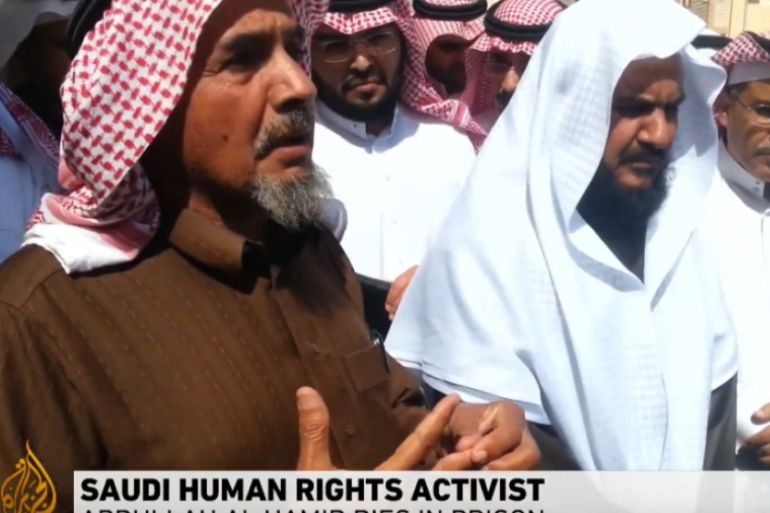Rights groups: Prominent Saudi rights activist dies in custody
Swedish group says Saudi authorities responsible for ‘inhumane treatment’ that led to Abdullah al-Hamid’s death.

Prominent Saudi rights activist Abdullah al-Hamid, 69, has died in custody in a hospital in Saudi Arabia, according to rights groups and a Swedish foundation that awarded him a renowned prize.
The Right Livelihood Foundation, which awards the prize known as the Alternative Nobel, said on Friday al-Hamid, who was serving an 11-year prison sentence, was taken to hospital after suffering from ill-health in a Riyadh prison earlier this year.
Keep reading
list of 3 itemsSaudi princess pleads for release from high-security prison
Torture in Saudi prisons: ‘Most oppressive era we have witnessed’
He subsequently had a stroke and fell into a coma in early April, according to rights groups including Amnesty International.
“Dr al-Hamid was a fearless champion for human rights in Saudi Arabia,” Lynn Maalouf, Amnesty’s Middle East research director, said in a statement.
“Our thoughts are with his family and friends, who for the past eight years had been deprived of his presence as a result of the state’s inhumane repression,” she added.
“He, and all other prisoners of conscience in Saudi Arabia, should never have been in jail in the first place.”
The Right Livelihood Foundation said al-Hamid was repeatedly denied crucial medical care and “paid the ultimate price for his convictions”.
Ole von Uexkull, head of the foundation, which awards the one million kronor ($99,000) prize, blamed Saudi authorities for his death, saying that al-Hamid’s “unlawful imprisonment and inhumane treatment … led to his death”.
“We hold Saudi authorities directly responsible for al-Hamid’s death, as they have deliberately denied him access to proper medical care for many months during his imprisonment,” von Uexkull added in a statement.
We are deeply saddened and shocked by the passing of Saudi #RightLivelihoodAward Laureate Abdullah al-Hamid.
We hold Saudi authorities directly responsible for al-Hamid's death, as he was denied medical care during his imprisonment.
Our statement➡️https://t.co/Q57Tvdkshd pic.twitter.com/o1F5Q75iFp
— Right Livelihood Foundation (@rightlivelihood) April 24, 2020
The foundation said in a statement that al-Hamid was tortured and harassed during his unlawful detention.
When hospitalised in January, al-Hamid was recommended to urgently undergo heart surgery, but was denied medical care leading to the deterioration of his health.
There was no immediate comment from Saudi Arabia.
‘Intentional medical negligence’
Prisoners of Conscience, a Twitter account which documents the situation of political prisoners in Saudi Arabia, said al-Hamid died due to “intentional [medical negligence] in prison that led to his death after he had a brain stroke and went into a coma for 15 days”.
Agnes Callamard, the UN special rapporteur for extrajudicial executions, wrote on Twitter that it is “sad news on this first day of Ramadan”.
“Prisoner of conscience, poet, human rights activist Dr Abdullah al-Hamid dies in custody in Saudi Arabia. RIP,” Callamard wrote.
“[The UN has] called for prisoners of conscience to be released from custody in the wake of COVID-19.”
Very sad news on this 1st day of #Ramadan2020: Prisoner of conscience, Poet, #humanrights activist Dr Abdullah al-Hamid dies in custody in #SaudiArabia. RIP. @UNHumanRights @UN_SPExperts have called for prisoners of conscience to be released from custody in the wake of #Covid19 pic.twitter.com/i6N8oEwOM1
— Agnes Callamard (@AgnesCallamard) April 24, 2020
‘Visionary and courageous efforts’
Al-Hamid in 2011 cofounded with Mohammad Fahad al-Qahtani the Saudi Association for Civil and Political Rights, known by its Arabic acronym HASEM. The group documented human rights abuses and called for a constitutional monarchy.
In 2013, they were sentenced to 11 and 10 years respectively. Soon after, other verdicts followed against nearly a dozen HASEM members.
The sentences came in the wake of the 2011 protest movements that engulfed the Middle East.
In 2018, the pair received the Right Livelihood Award together with activist and lawyer Waleed Abu al-Khair “for their visionary and courageous efforts, guided by universal human rights principles, to reform the totalitarian political system in Saudi Arabia”.
Al-Khair, who defended a blogger sentenced to prison and lashings over his posts, was arrested in 2014 for signing a statement with dozens of others calling for reforms in the kingdom.
He later received a 15-year sentence for “disobeying the ruler” and “harming the reputation of the state by communicating with international organisations,” likely over his work as an outspoken activist.
Created in 1980, the annual Right Livelihood Award honours efforts that the prize founder, Swedish-German philanthropist Jakob von Uexkull, felt were being ignored by the Nobel Prize committee.